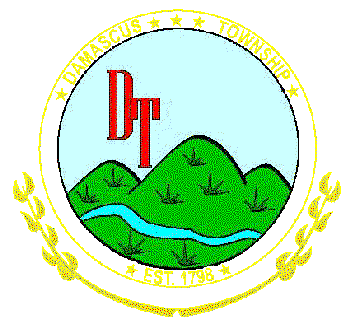
WAYNE COUNTY, PENNSYLVANIA
60 CONKLIN HILL ROAD, DAMASCUS, PA 18415

 |
WAYNE COUNTY, PENNSYLVANIA 60 CONKLIN HILL ROAD, DAMASCUS, PA 18415 |
 |

NEWS ITEMS COURTESY OF THE PENNSYLVANIA TOWNSHIP NEWS MAGAZINE
PRESENTED BY THE DAMASCUS TOWNSHIP BOARD OF SUPERVISORS
First came the news that Gov. Ed Rendell wants to temporarily raise income taxes to balance the state's sickly budget.
Now, lawmakers are considering legislation that threatens to take an even bigger chunk out of your wallet. House Bill 1500 would create a true hardship for most of Pennsylvania, including your township and others that rely on the Pennsylvania State Police for protection.
Under the proposal, which does NOT increase State Police coverage, more than 1,200 municipalities would be subject to a hefty annual service fee. To avoid it, these communities would be required by law to either start a full-time police department or contract with a neighboring or regional force.
Although the per-person fee has been described by a few legislators as a bargain, that's simply not the case. Because, the truth is, if you live in a township that is mandated to pay it, you can say goodbye to more of your money and hello to higher property taxes.
That is, unless you and your neighbors work with township officials to stop it.
"It's a lot of money"
The idea of charging municipalities for State Police protection isn't new; what is new is the scope of this particular bill.
Up until now, lawmakers had included population caps to exempt small municipalities from paying for coverage. Not so with HB 1500, which would affect nearly half of the state's municipalities, including those with part-time police departments, and generate about $450 million a year. The bill would require townships without police departments to eventually pay an annual fee of $156 per person, while municipalities with part-time police protection would pay $52 per person.
In cold hard numbers, that means that Pennsylvania's largest affected municipality, Hempfield Township in Westmoreland County (population 40,000), would be charged $6 million, and its smallest, Green Hills Borough in Washington County (population 18), would pay about $2,800.
Regardless of a municipality's size or budget, the impact of this legislation could be devastating and force many townships into a corner.
"We can't afford a police department, and we sure as heck can't afford to pay the State Police," said one elected official from a small community that is facing a $24,000 annual payment. "This is not just a couple of dollars. It's a lot of money."
Marvin Meteer of the Pennsylvania State Association of Township Supervisors poses the question: "How would my township, a small, rural municipality of 1,340 residents, and others like us pay for this service? You guessed it: We would have to institute a property tax increase - possibly a large one - either to cover the fee or to form a local police force."
And here is something else you should know about House Bill 1500: Your township will be spending more of your tax dollars for State Police services but will not be getting more protection in return.
"That's something many people don't realize," PSATS President Kenneth L. Grimes says. "The State Police will continue to operate, much like they always have, with very limited manpower. House Bill 1500 won't do anything to increase coverage or decrease response times."
Some, including the bill's sponsor, Rep. Mike Sturla, contend that municipalities without fulltime local police have been draining the system for too long and should be required to pay an extra fee for State Police services.
"My legislation is about fairness and equity because it is obvious there is a serious inequity in how we fund police services in our state," Sturla said in a recent news release.
However, Grimes says, one man's fairness is another man's hardship.
"State lawmakers are asking residents in these municipalities to pay twice for the same service - with their tax dollars and with this fee. That's not right," he says. "And on top of that, the legislation would force township supervisors to do things they would rather not do, such as raise taxes or start a police force.
"And who will end up footing the bill? Our residents. Now, how fair is that?
So what can you, a township resident, do to stop the passage of House Bill 1500?
The answer is simple: Join forces with your township officials, many of whom have been flooding Harrisburg with calls and e-mails opposing the legislation.
You and your neighbors have a lot to lose
- namely, your hard-earned money - if this bill passes. Before taking action, though, call a township supervisor, who can explain the financial impact of the State Police fee on your municipality. Then, armed with the facts, call or write your state lawmakers. (Your township can provide their names, numbers, and addresses, which also are available online.)
"Township supervisors don't want to raise taxes," Grimes says. "However, they may not have a choice if House Bill 1500 gains momentum, which it could in this economic climate where the state is pressed to find extra dollars. Can we beat this legislation? Absolutely, but this isn't a battle we can - or should fight - alone. We need our taxpayers in our corner."